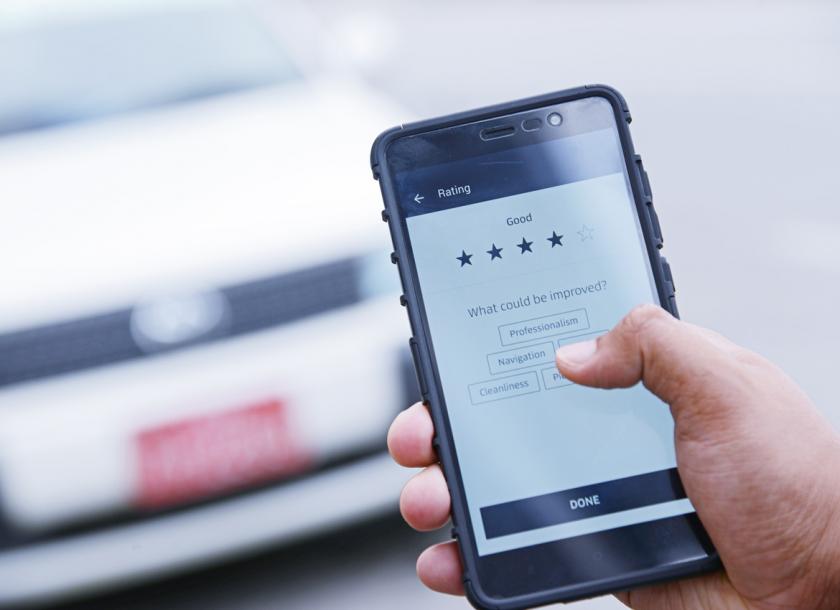Myanmar: Uber’s Yangon strategy stumbles, competitors push ahead
Complaints about Uber in Yangon are mounting even as officials of the company insist that it continues to improve its ride-hailing service for both drivers and passengers.
US-based Uber first began operating in Yangon last May, joining local taxi operators Oway Ride and Hello Cabs. Months later, Singapore-based Grab, also launched its ride-hailing service in the city.
To compete with its rivals, Uber sought to attract more riders with promotional fares, an easy-to-use mobile app and drivers who arrived to pick up their passengers in well-maintained, air-conditioned cars. Meanwhile, it drew more drivers by paying them generous incentives for accepting trip bookings from passengers.
However, drivers have said that Uber’s cut of their income is 25 percent, which is higher than Grab, Oway Ride and Hello Cabs. Meanwhile, they also claimed Uber had stopped paying out the same level of incentives. As a result, many drivers have since abandoned the app in favour of more generous operators.
“As far as I know, some drivers have stopped using the Uber app because the volume of incentives is not as favourable as before. This is why there are only a few drivers who are still using Uber,” said U Hlaing Maw, a taxi driver.
Vicious cycle
The shortage of Uber taxis on the road has, in turn, infuriated passengers and driven them elsewhere, resulting in a vicious cycle of diminishing users of the app.
Ma Su Myat, an Uber customer from Ahlone township is among the passengers affected by the shortage.
‘’We called an Uber taxi from Yangon International Airport. But the app showed that there were no available cars in the area even though we tried to book a taxi more than once. This shouldn’t be because the airport is a popular destination. We should have been able to book an Uber taxi easily,” she said.
For his part, U Hlaing Maw said it is hard for him to accept bookings as many passengers are usually located too far away to justify the journey taken to pick them up.
“Sometimes we get bookings for a short trip costing just K1,500. However, the time and cost taken to pick up the passenger already exceeds the fare. Because the number of Uber drivers has fallen, the app is now connecting drivers with passengers located further and further away,” he said.
 Fewer taxi drivers remain on Uber’s app after some claimed incentives have fallen. Zarni Phyo/The Myanmar Times
Fewer taxi drivers remain on Uber’s app after some claimed incentives have fallen. Zarni Phyo/The Myanmar Times
Regular incentives, promotions
In response, Daw Ei Phyu Lwin, general manager of Uber Myanmar, said the company continues to provide “regular incentive plans and promotions. Aside from this, we also do regular driver engagement events to take the ir feedback and adjust these plans where we see fit and so that they benefit driver partners. We will be looking forward to doing more of this in 2018.”
“Uber’s added value for drivers resides in its ability to provide them with reliable and scaleable income. Uber has grown a lot since we launched in Yangon, we now have more riders than before and therefore, more income opportunities for drivers,” she added.
To ensure its passengers stay on board, Uber recently launched promotions providing passengers K1,000 off their taxi fares. Still, with some riders saying that taxis are still difficult to hire on the Uber app, the move could be a little too late.
“In my experience hiring Uber taxies, I have to wait at least ten minutes for a driver to accept my booking. In the past, it took just 3-4 minutes. Now, drivers are cancelling my booking because they are too far away from my location. I’d like to find out how Uber is going to solve this problem,” said Ma Nway Nway Thaw, a resident of South Okkalapa township.
‘’Our everyday mission is to make drivers and riders collaborate in making transport in Yangon safer, more reliable and more comfortable. The challenge resides in having both drivers and riders grow at the same time. As more and more riders are using the app, we are now actively helping drivers get on board with the app and face the flow of rider solicitations,” said Daw Ei Phy Lwin.
While most taxi riders have embraced mobile ride-hailing due to the reliability and security the system offers, it appears that the operator who can afford to provide the cheapest fares and highest incentives will win the battle for market share in Yangon.
Source: https://www.mmtimes.com/news/ubers-yangon-strategy-stumbles-competitors-push-ahead.html


 Thailand
Thailand




